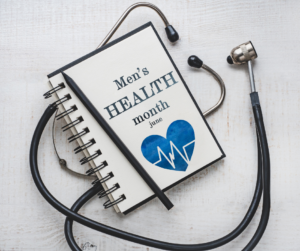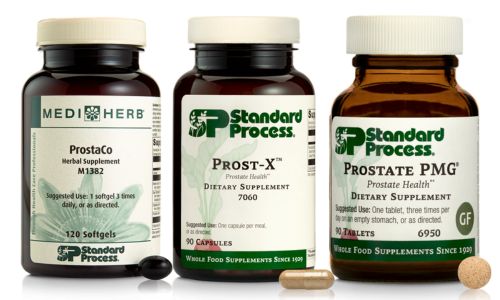By Claire Bacon, ACN, CNC
Ask any man what concerns him about his future health, and one of his top responses will be prostate health and avoiding prostate cancer. This is one of the top increasing trends affecting men’s health today. Fortunately, there is much you can do proactively to stay well!
As you age, your prostate may grow, becoming enlarged and adding pressure to the urethra. More severe swelling is known as prostatitis. Additionally, there could be environmental factors impacting your hormones and cellular processes that increase risk for prostate cancer.
Prostate cancer is the most common form of cancer affecting men in the United States, coming in just ahead of lung cancer. It is the fourth most commonly diagnosed cancer in the world. An estimated 290,000 men in the US were diagnosed with prostate cancer in 2023. Over 70 percent of these men are over the age of 65.
Although there are a variety of medical treatments available for enlarged prostate, not all of these may be right for every man. Luckily, we have several nutritional strategies to help protect your prostate health well into the future!

Physiology
The prostate is a gland located just below the bladder and in front of the rectum. It should be about the size of a walnut, however, when enlarged may grow as large as a lemon. The prostate surrounds the urethra, which is the tube that empties urine from the bladder. The prostate gland produces fluid that makes up part of the semen.
Sometimes, an elevated PSA test may be the first sign that something is off. Whereas many men don’t feel symptoms, the signs of prostate inflammation may include:
- Frequent urination
- Weak or interrupted urine flow
- Urinating frequently at night
- Pain, burning, or blood in the urine
- New onset of erectile dysfunction
- Discomfort or pain when sitting.
Benign prostatic hypertrophy (BPH) is a common condition that can cause the above symptoms. A subclinical bladder infection – usually yeast or fungal overgrowth – can cause or worsen prostate or bladder irritation and symptoms. This type of inflammation may go on for years without being detected.

Potential Risk Factors for Prostate Cancer
- Genetic Predisposition. Certain genes that may carry an increased risk of developing prostate cancer include HPC1, HPC2, HPCX, CAPB, ATM, FANCA, and HOXB13. However, none has been directly shown to be specific to this disease. We know that genes don’t predetermine our fate; if we create a favorable environment within the body, our genetic expression can be favorable as well.
- Agent Orange exposure. The U.S. Dept. of Veterans Affairs (VA) lists prostate cancer as associated with exposure to Agent Orange, an herbicide used during the Vietnam War. Veterans certainly have been exposed to many chemicals over the years. This is why detoxification on a regular basis is so important.
- Eating and exercise habits. Some studies suggest there may be a connection between diet, exercise and prostate issues. For example, obesity is a top driver of prostate cancer. Specifically, a diet that includes too much sugar and alcohol can keep insulin high. This can tip sex hormones unfavorably towards inflammatory pathways. In addition, a sedentary lifestyle allows toxins to remain in the system. A lack of daily movement and sweating may cause deep metabolic disruption.

Hormone Balance
In women, a little bit of testosterone is made in three different places (adrenals, ovaries and peripheral tissues). However in men, almost 100% of testosterone is made in the testicles. It’s really important that men have optimum testosterone levels to improve sexual function, to support lean body mass, to prevent cardiovascular disease, and even to maintain good cognition.
But what happens when male hormones start going out of balance? Testosterone starts going down, either because of diminished production, or increased conversion. Conversion turns Testosterone into Estrogen (through aromatase enzyme), or into DHT (through 5-alpha reductase enzyme). Typically, men don’t want either of these things to happen in excess! Surprise – more than any other factor, the amount of sugar in our diet (causing high insulin) is often the reason why these enzymes get promoted excessively in the body.
Because with increased estrogen, a man may notice excess fatty tissue on the chest or the belly. He may have less virility and libido, and/or more emotional readiness to cry. He may also notice increased cherry hemangiomas (little red moles). With increased DHT, there is often a loss of hair. With both imbalances, there is an increased risk of prostate issues.
Obviously, we want to be proactive and understand the underlying hormone issues as early as possible. Early clues help us take steps to fix any problems. If you have a borderline PSA test, or some concerning family history, you may like to do some objective testing. Hormone testing can help to get your questions answered – even before any symptoms appear.
Testing
In our office, we offer two types of testing in order to understand male hormones in more detail. The Diagnostechs Expanded Male Hormone Panel (eMHP) is a saliva test that includes the following hormones:
- Progesterone,
- DHEA,
- Androstenedione,
- Estrone,
- Estradiol,
- Testosterone, and
- DHT.
As an alternative, the DUTCH panel is a urine test that shows us these same values, along with a few more. It costs a little more, but also shows:
- Cortisol and Cortisone,
- Downstream metabolites,
- Vitamins B6 and B12,
- Glutathione,
- Dopamine, and
- Melatonin.
The advantage of the DUTCH is that it shows us how your body is detoxifying your excess hormones – whether in a healthy or inflammatory manner. Both tests are very helpful in understanding your hormonal balance. Please request a personalized Nutrition Consult if you’re interested in learning more.

Important Nutrients and Herbs for Prostate Health
Saw Palmetto extract is an herb well-known for reducing DHT conversion and supporting normal hair growth. This herb inhibits the 5-alpha reductase enzyme. This action prevents converting testosterone into DHT, thus preventing impact to hair follicles.
Lycopene is an antioxidant that gives certain fruits and vegetables their red color. Health benefits include regulating cholesterol and blood pressure and counteracting free radical damage in the body. Free radicals can accelerate aging and promote cancer. Lycopene most commonly comes from ketchup and tomato sauce in the average American diet. You could increase your consumption by also choosing:
- Apricots,
- Guava,
- Grapefruit, and
- Watermelon.
Quercetin is a naturally occurring bioflavonoid present in black tea, apples, onions, and capers. In addition to supporting immune health and detoxification, quercetin is anti-inflammatory, too. Quercetin helps ensure normal cell death (apoptosis) and inhibits excess cell division.
Zinc – is a mineral that supports immune health, skin, and testosterone production. Zinc is necessary for cellular replication and protein synthesis, utilized in proper hair growth. Good zinc sources include:
- Eggs,
- Legumes,
- Oysters,
- Seafood, and
- Meats.
Supplements for Prostate Health

- Prostate PMG is a specialized prostate tissue extract that supports normal cellular growth and repair.
- ProstaCo is a combination of Saw Palmetto, Nettle Root and Crataeva in a base of pumpkin seed oil. These herbs combine to inhibit 5-alpha reductase enzyme.
- Prost-X contains three key ingredients: Tillandsia Spanish moss, an absorbable form of calcium, and bovine prostate extract. These ingredients provide Vitamin F (essential fatty acids) that help with the body’s utilization of calcium. As it appears high blood calcium correlates with increased risk for prostate cancer, Vitamin F helps keep calcium utilized in the tissues. In this way, fatty acids clear excess calcium from the blood.
- Zinc Complex is a blend of whole foods rich in zinc, copper, and iron. A perfect blend to support prostate health and testosterone levels!
Final Thoughts
Our top priority is to make sure you and your loved ones have the right information to make the most of your health. Education is empowering! The more you know, the more you can use your food therapeutically. We aim to help you take control of your health!


